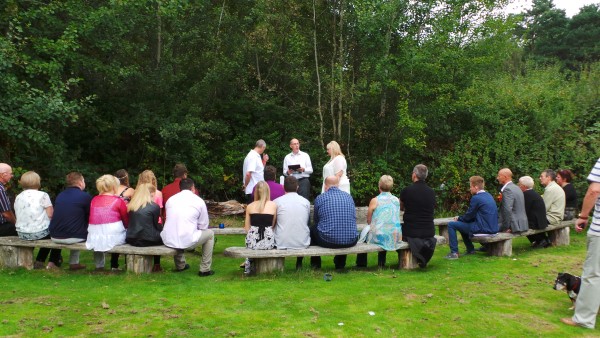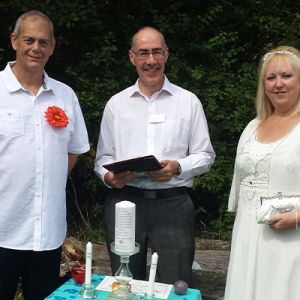
by Michael | May 14, 2013 | Blog
The papers are ever fuller with pictures and stories about celebrities who have chosen to renew wedding vows. Is this something that we mere mortals should be considering too?
Sure, it’s a lovely way to mark a particular anniversary – whether it’s 50, 25, 20, 10, 5 years (or even one!). Vow renewals are a beautiful gesture of enduring love. However, they do cost money, and it is worth thinking hard about the logistics.
Where to renew?
Of course, you can return to the venue where you originally married.

But there’s nothing to stop you choosing a hot-air balloon or a beach, say, and staying on for a holiday afterwards.
Why renew?
Apart from celebrating an anniversary, you might want the ceremony because you have made new friends since your wedding, and you would love to include them this time around. Or maybe some family members couldn’t make it for the original wedding.
You may want to involve some of these people in your ceremony (remember, the celebrant will work with you to ensure that you get the ceremony that YOU want). The vow renewal will be personalised (which may well not have been the case at your wedding).
Sometimes, a major life event may trigger your decision to hold a vow renewal. It could be that your marriage has come out the other end of a crisis (financial, an affair, ill health etc.). It might be that you are approaching a time of major change (retirement, children flying the nest, etc.).
Any of these reasons may inspire you to go for something a little more serious than a celebratory anniversary party.
Of course, it might just be that you are attracted by the beach wedding you never had!
Be that as it may, a public vow renewal forces you to think deeply about your relationship with your partner. The vows are the central part of the whole ceremony. This is your chance to say the things that matter and that you want your partner to hear and accept.
Conclusion
Come what may, your relationship will surely have moved on and deepened. That really is something worth celebrating!
by Michael | May 7, 2013 | Blog
One of the joys of weddings is a mix of traditional and modern. I’d like to examine some of the traditions, and suggest a modern take as a possible alternative.
1. Wearing a Wedding Veil
Traditionally, a veil was a symbol of purity; nowadays, it tends to be worn simply because it is lovely and has a romantic element (and indicates that “this is the bride”). Blushers can be worn alone or as part of a two or three-layer veil ensemble. The longest piece is usually worn for the ceremony only, and it is detached before the reception.
Nowadays, some prefer to replace the veil with a millinery cap or a tiara.
2. Something Old, New, Borrowed, Blue
A charming tradition whereby the bride carries personal treasures on her wedding day. They will normally mean something only to those closest to her.
Nowadays, the groom can participate too. He might wear his father-in-law’s cuff-links, for example.
3. Throwing Rice
Throwing rice, or confetti, is an ancient and lovely custom, that symbolizes the showering of abundance and fertility on the newly-weds. (It could be wheat, as in France or sweets and sugared nuts, as in Italy.)
A modern-day alternative is biodegradable confetti. Also quite popular are banners, blowing bubbles or little noisemakers.
4. Tossing the Bouquet
One of the most exciting moments in the ceremony is when the single women wait for the bride to throw the bouquet over her shoulder.
Today, some brides choose to save their bouquet and throw, instead, a special bouquet or a “fortune bouquet” (maybe a dozen small flower clusters tied by a ribbon which the bride unties before throwing).
5. Cutting the Cake
Virtually no wedding – of whatever scale – omits the cake-cutting. The couple take centre-stage, and the bride places her hand on the knife, with the groom’s over hers. They cut the cake and then feed each other (symbolising that they will always care for one another).
Nowadays, there might not actually be a cake. In that case, it will probably be a question of the bride eating part of a pastry before the groom’s turn.
6. The Car
Many a wedding ends with a car driving the happy couple off, to the accompaniment of cans or old boots tied to the bumper, with “just married” sprayed on the car in foam.
Of course, today, the vehicle may be a motor-bike or coach and horses.
An interesting modern idea is to have the guests’ cars decorated during the reception. You could have a ‘thank you for coming’ card attached to the wing-mirror, for example.
So whether you stick to the traditional or innovate a bit, these ideas may add an extra zest to the big day. Enjoy!
Michael Gordon is a celebrant based in London.
by Michael | May 2, 2013 | Blog
Marriage can be stressful. Can marriage and health really go together?
Apparently so. Cardiologists will tell you that being unmarried increases the risk of heart attacks in both women and men, regardless of age.
Even cohabiting couples have better prospects. Those unmarried – men (168%) and women (175%) – have higher chances of death after heart attacks. So says the “European Society of Cardiology”.
Why?
Reasons could be that people already in ill health may be less likely to marry or more likely to divorce. Alternatively, married people enjoy higher levels of social support, leading them to make healthier choices.
But there could well be other explanations.
Strengthening ties
Whatever the health benefits, you’ll probably agree with my earlier statement that marriage can still be stressful. Everybody needs to work at it.
In order to build that relationship, you should try a few strategies. Many are plain common-sense – but we don’t always do what is sensible!
Eight Suggestions
1. Touch each other regularly. This doesn’t have to be sexual. I remember Jack Canfield stating that about nine hugs a day is ideal.
2. Communicate. Don’t allow grievances to build up. Vent – but don’t overdo it! And don’t criticise for the sake of it. It’s good to validate your partner when you can.
3. Be nice. Just because you’re married doesn’t mean you are justified in taking out all your irritations on your partner. You can still be kind, polite and respectful.
4. Treat your partner like a friend. You both have each other’s best interests at heart, so develop that relationship.
5. Don’t let yourself down. Don’t present yourself to the world as a flirt and attention-seeker (unless that is how you are with your partner). Don’t put strain on your relationship.
6. A little attention won’t hurt. Occasionally showing your partner you care, with a little gift, say, can help cement the relationship. Praise and gratitude are great too!
7. Try and be positive. This will help you both get through the day. Of course, there are going to be problems to be faced.
8. Be prepared to develop. You should (both) try new things from time to time, whether it be a self-development course or a new hobby. Getting stuck in a rut will benefit nobody.
I hope you’ll agree that, with only a little work, you can improve your marriage AND your health at the same time! Please try it – and report back to me!
Michael is a celebrant based in London.
by Michael | Apr 25, 2013 | Blog
Following on from my last blog, I bring the fruits of some research (American, of course!), to help solve the problem of how to make a marriage work. Marital happiness is far from being a ‘given’ for any couple.
The research, using 120 couples and led by a university professor, Eli Finkel, suggests that it is important for couples to review their relationship three times a year.
The study
Half the volunteers produced a written appraisal of their marriage three times a year for two years, or quarterly or for 21 minutes a year. The other half did none of this.
The findings
“The couples who did the writing exercise three times a year recovered more quickly from arguments”, said Professor Finkel. Connecting between arguments paves the way for a speedy recovery when we do fight.
So this looks like a course worth adopting.
A logical consequence
It has also been suggested that financial matters should be reviewed in a similar way. After all, this is one area that can impact very strongly on marital happiness.
Arguably, this could put an even greater strain on the marriage, so it might be as well to do it monthly. That way you can nip potential problems in the bud.
Conclusion
The idea of sitting down and writing an appraisal may be less than attractive (especially, now you’ve left school). However, a regular written review may do the trick and give your marriage a boost.
That’s surely worth a try!
Michael is a celebrant based in London.
by Michael | Apr 18, 2013 | Blog
Most of us would aspire to a healthy marriage. I recently wrote about how to survive marriage. Let’s be more positive now, and examine this further.
The key elements?
Isn’t it simple enough to have a healthy marriage? Surely, you just need to be in love, find a ‘soul-mate’ and be prepared to communicate with each other?
Actually, a combination of all three is really not that easy to achieve.
But even if you manage to, more is required.
The starting-point
Even if blessed with these elements, it is best if you both have high self-esteem and are open to forming a team. In other words, you are can stand on your own feet, but make a considered choice to share your life.
Each partner should be willing to be influenced by their partner – in that way, positive change can take place. However, entering marriage in the hope that your spouse will heal you is not a good basis.
Even worse, is the expectation that your spouse will meet all your needs. Nobody can do that, either materially or spiritually. Moreover, men still occasionally have to bond with men, and women with women.
A few things to beware of
- Possessiveness & jealousy
- Refusal to compromise
- Fear of intimacy
- Negativity
- Addictive behaviour
- Attention-seeking
- Lack of respect
These are all things that can bring down a marriage.
Conclusion
Emotionally healthy men and women, with healthy expectations, are most likely to enjoy healthy marriages. They should be able to build solid foundations for their relationship, and be open to making adjustments as they go.
Love is vital, but it’s also about becoming (and remaining) a team, with both working to move in (more or less!) the same direction.
It’s simple enough – but not necessarily easy!
Michael Gordon is a celebrant based in London


